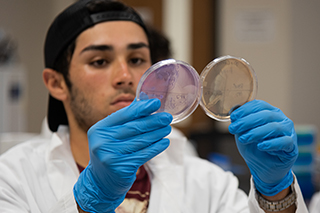Undergraduate Major
The Biology program provides a broad and robust foundation to understand the life sciences. The program emphasizes the development of critical thinking and communication skills, as well as competency in experimental design, data analysis and methodology for lab and field research. Overall, students will have a wide range of skill-building opportunities outside of the classroom through undergraduate research, internships, study abroad, service learning and field courses.
DEGREE OPTIONS
The Department of Integrative Biology offers a B.S. in Biology on the St. Petersburg
campus. Students can complete all degree requirements on the St. Petersburg campus.
View more information about options on the USF Tampa and Sarasota-Manatee campuses.
BIOLOGY AT USF ST. PETERSBURg
Through the Biology program, students can understand the foundations of biology at all levels, from single-celled organisms to global-epidemiological studies. They do so by becoming immersed in many cross-disciplinary methods that are used to answer biological questions from computer modeling to field studies.
Students will have the option to concentrate their studies in one of four subdisciplines of biology:

- The Animal Biology concentration provides students with a firm foundation in the principles
of biology, with special emphasis on form and function, ecology and evolution, and
diversity of animals. This concentration serves students interested in veterinary
medicine, wildlife management and careers working in a zoo or aquarium. It also provides
a foundation for pre-medical studies.
- The Ecology and Evolution concentration serves students interested in careers in ecology,
environmental management and consulting, restoration, natural resources management,
conservation biology, and museum conservators.
- The Medical Biology concentration has a pre-professional focus and prepares students
for careers in medicine, dentistry, pharmacology, veterinary medicine, physical therapy
and nursing.
- The Plant Biology concentration provides students with a firm foundation in the principles
of biology, with special emphasis on form and function, ecology and evolution, and
diversity of plants. This concentration serves students interested in careers in plant
ecology and conservation, taxonomy, environmental management and consulting or graduate
studies in the plant sciences.
- Biology students also have the option to complete a General Biology program of study instead of one of the above concentrations, selecting elective courses of interest.
Faculty on the St. Petersburg campus conduct research on a wide variety of subjects: animal behavior, biodiversity, cell biology, conservation biology, deep-sea biology, ecology, freshwater botany, genetics, herpetology, immunology, invasive species biology, invertebrate zoology, limnology, mammalogy, marine ecology, microbiology, paleolimnology, phycology, physiology and sociobiology.
Biology students on the St. Petersburg campus can participate in faculty research through undergraduate research or volunteer opportunities, and many also assist Conservation Biology M.S. graduate students with their lab or field work. These are great ways to gain research experience, and explore personal and professional research interests.
Internships and other outside-the- classroom opportunities available through this program and in the city of St. Petersburg and the Tampa Bay region include Boyd Hill Nature Preserve, FWC Fish and Wildlife Research Institute, U.S. Geological Survey, Bayfront Hospital, John Hopkins All Children’s Hospital, Florida Botanical Gardens, Florida Aquarium, Mote Marine Lab, Clearwater Aquarium, as well as local veterinary hospitals and rescue centers.
The skills and experiences through the Biology program will prepare students for a successful career in biology or further education in a variety of areas such as health science, data science, environmental science and science education. Students have gone onto prestigious graduate programs in biology (from zoology and botany to conservation biology and evolution), professional degrees in medicine, dentistry, veterinary medicine and pharmacology, and biology careers with industry and government agencies.
REQUIREMENTS FOR THE MAJOR IN BIOLOGY
Always refer to the Undergraduate Catalog for degree requirements. Students will normally begin progress toward the major by taking at least one course from the major core, as these often serve as prerequisites for the electives. Students are urged to consult with the Biology advisor to create the most beneficial set of courses.
QUESTIONS?
For questions about this program, contact an Academic Advisor.